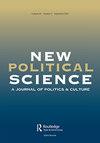Karl Polanyi and the Rise of Fascism
IF 0.5
Q4 POLITICAL SCIENCE
引用次数: 0
Abstract
Abstract This article reconstructs Karl Polanyi’s account of fascism’s rise in his 1935 article, “The Essence of Fascism.” Following the elevation of Hitler to power in 1933, Polanyi embarked on a reassessment of Nietzsche, Othmar Spann, Spengler, Evola, and other figures of the interwar conservative revolution. He argues that the fascist quest for national unity emerges when 19th century liberalism fails to address the growing atomization and economic dislocation of modern society. On the one hand, fascism valorizes the mythopoetic, prehistorical vitalism that liberal rationalism and social democracy sought to purge from public life. On the other, fascism aspires to a higher form of elitist, technological mastery than egalitarian states can achieve. These tensions, he predicts, will result in the radicalization and collapse of fascist regimes in a European war. This article illuminates Polanyi’s deep understanding of political modernity and the contemporary implications of his philosophical critique of the far right.波兰尼与法西斯主义的兴起
摘要本文重构了卡尔·波兰尼在1935年的文章《法西斯主义的本质》中对法西斯主义崛起的描述。1933年希特勒上台后,波兰尼开始重新评估尼采、奥斯曼·斯潘、斯宾格勒、埃沃拉和其他两次世界大战保守革命的人物。他认为,当19世纪的自由主义未能解决现代社会日益原子化和经济混乱的问题时,法西斯对国家统一的追求就出现了。一方面,法西斯主义将自由理性主义和社会民主试图从公共生活中清除的神话般的史前活力主义赋予了价值。另一方面,法西斯主义渴望获得比平等主义国家更高形式的精英主义技术掌握。他预测,这些紧张局势将导致欧洲战争中法西斯政权的激进化和崩溃。本文阐述了波兰尼对政治现代性的深刻理解,以及他对极右翼的哲学批判的当代意义。
本文章由计算机程序翻译,如有差异,请以英文原文为准。
求助全文
约1分钟内获得全文
求助全文

 求助内容:
求助内容: 应助结果提醒方式:
应助结果提醒方式:


